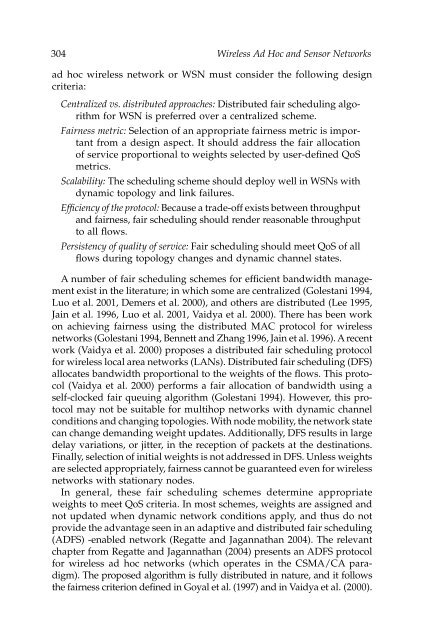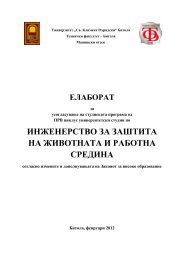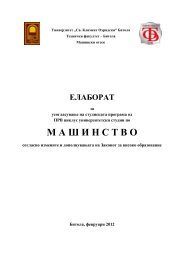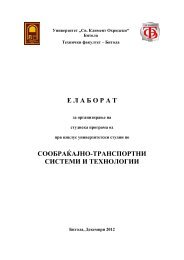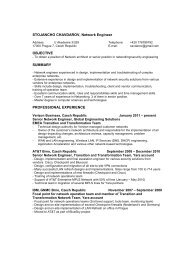- Page 2 and 3:
Wireless Ad Hocand SensorNetworksPr
- Page 4:
18. Chaos in Automatic Control, edi
- Page 7 and 8:
CRC PressTaylor & Francis Group6000
- Page 10 and 11:
Table of Contents1 Background on Ne
- Page 12 and 13:
3 Congestion Control in ATM Network
- Page 14 and 15:
5.4.2 Distributed Power Controller
- Page 16 and 17:
7.3 Adaptive and Distributed Fair S
- Page 18:
9.2.2 Overview.....................
- Page 21 and 22:
the number of connections in each l
- Page 23 and 24:
y Maheswaran Thiagarajan, and tirel
- Page 25 and 26:
2 Wireless Ad Hoc and Sensor Networ
- Page 27 and 28:
4 Wireless Ad Hoc and Sensor Networ
- Page 29 and 30:
6 Wireless Ad Hoc and Sensor Networ
- Page 31 and 32:
8 Wireless Ad Hoc and Sensor Networ
- Page 33 and 34:
10 Wireless Ad Hoc and Sensor Netwo
- Page 35 and 36:
12 Wireless Ad Hoc and Sensor Netwo
- Page 37 and 38:
14 Wireless Ad Hoc and Sensor Netwo
- Page 39 and 40:
16 Wireless Ad Hoc and Sensor Netwo
- Page 41 and 42:
18 Wireless Ad Hoc and Sensor Netwo
- Page 43 and 44:
20 Wireless Ad Hoc and Sensor Netwo
- Page 45 and 46:
22 Wireless Ad Hoc and Sensor Netwo
- Page 47 and 48:
24 Wireless Ad Hoc and Sensor Netwo
- Page 49 and 50:
26 Wireless Ad Hoc and Sensor Netwo
- Page 51 and 52:
28 Wireless Ad Hoc and Sensor Netwo
- Page 53 and 54:
30 Wireless Ad Hoc and Sensor Netwo
- Page 55 and 56:
32 Wireless Ad Hoc and Sensor Netwo
- Page 57 and 58:
34 Wireless Ad Hoc and Sensor Netwo
- Page 59 and 60:
36 Wireless Ad Hoc and Sensor Netwo
- Page 61 and 62:
38 Wireless Ad Hoc and Sensor Netwo
- Page 63 and 64:
40 Wireless Ad Hoc and Sensor Netwo
- Page 65 and 66:
42 Wireless Ad Hoc and Sensor Netwo
- Page 67 and 68:
44 Wireless Ad Hoc and Sensor Netwo
- Page 69 and 70:
46 Wireless Ad Hoc and Sensor Netwo
- Page 72 and 73:
2BackgroundIn this chapter, we prov
- Page 74 and 75:
Background 51u(k)x n (k + 1)x n (k)
- Page 76 and 77:
Background 53with x( 0)being the in
- Page 78 and 79:
Background 55with tr(.) the matrix
- Page 80 and 81:
Background 57nGiven a function ft (
- Page 82 and 83:
Background 592.3.2 Lyapunov Stabili
- Page 84 and 85:
Background 61as well as Jagannathan
- Page 86 and 87:
Background 63The subsequent example
- Page 88 and 89:
Background 65Evaluating this along
- Page 90 and 91:
Background 67Now, select the feedba
- Page 92 and 93:
Background 69is SISL if and only if
- Page 94 and 95:
Background 71L 1 (x)L(x, t)L 0 (x)0
- Page 96 and 97:
Background 73for some R > 0 such th
- Page 98 and 99:
Background 75Evaluating the first d
- Page 100:
Background 77Section 2.4Problem 2.4
- Page 103 and 104:
80 Wireless Ad Hoc and Sensor Netwo
- Page 105 and 106:
82 Wireless Ad Hoc and Sensor Netwo
- Page 107 and 108:
84 Wireless Ad Hoc and Sensor Netwo
- Page 109 and 110:
86 Wireless Ad Hoc and Sensor Netwo
- Page 111 and 112:
88 Wireless Ad Hoc and Sensor Netwo
- Page 113 and 114:
90 Wireless Ad Hoc and Sensor Netwo
- Page 115 and 116:
92 Wireless Ad Hoc and Sensor Netwo
- Page 117 and 118:
94 Wireless Ad Hoc and Sensor Netwo
- Page 119 and 120:
96 Wireless Ad Hoc and Sensor Netwo
- Page 121 and 122:
98 Wireless Ad Hoc and Sensor Netwo
- Page 123 and 124:
100 Wireless Ad Hoc and Sensor Netw
- Page 125 and 126:
102 Wireless Ad Hoc and Sensor Netw
- Page 127 and 128:
104 Wireless Ad Hoc and Sensor Netw
- Page 129 and 130:
106 Wireless Ad Hoc and Sensor Netw
- Page 131 and 132:
108 Wireless Ad Hoc and Sensor Netw
- Page 133 and 134:
110 Wireless Ad Hoc and Sensor Netw
- Page 135 and 136:
112 Wireless Ad Hoc and Sensor Netw
- Page 137 and 138:
114 Wireless Ad Hoc and Sensor Netw
- Page 139 and 140:
116 Wireless Ad Hoc and Sensor Netw
- Page 141 and 142:
118 Wireless Ad Hoc and Sensor Netw
- Page 143 and 144:
120 Wireless Ad Hoc and Sensor Netw
- Page 145 and 146:
122 Wireless Ad Hoc and Sensor Netw
- Page 147 and 148:
124 Wireless Ad Hoc and Sensor Netw
- Page 149 and 150:
126 Wireless Ad Hoc and Sensor Netw
- Page 151 and 152:
128 Wireless Ad Hoc and Sensor Netw
- Page 153 and 154:
130 Wireless Ad Hoc and Sensor Netw
- Page 155 and 156:
132 Wireless Ad Hoc and Sensor Netw
- Page 157 and 158:
134 Wireless Ad Hoc and Sensor Netw
- Page 159 and 160:
136 Wireless Ad Hoc and Sensor Netw
- Page 161 and 162:
138 Wireless Ad Hoc and Sensor Netw
- Page 163 and 164:
140 Wireless Ad Hoc and Sensor Netw
- Page 165 and 166:
142 Wireless Ad Hoc and Sensor Netw
- Page 167 and 168:
144 Wireless Ad Hoc and Sensor Netw
- Page 170 and 171:
4Admission Controller Design for Hi
- Page 172 and 173:
Admission Controller Design for Hig
- Page 174 and 175:
Admission Controller Design for Hig
- Page 176 and 177:
Admission Controller Design for Hig
- Page 178 and 179:
Admission Controller Design for Hig
- Page 180 and 181:
Admission Controller Design for Hig
- Page 182 and 183:
Admission Controller Design for Hig
- Page 184 and 185:
Admission Controller Design for Hig
- Page 186 and 187:
Admission Controller Design for Hig
- Page 188 and 189:
Admission Controller Design for Hig
- Page 190 and 191:
Admission Controller Design for Hig
- Page 192 and 193:
Admission Controller Design for Hig
- Page 194 and 195:
Admission Controller Design for Hig
- Page 196 and 197:
Admission Controller Design for Hig
- Page 198:
Admission Controller Design for Hig
- Page 201 and 202:
178 Wireless Ad Hoc and Sensor Netw
- Page 203 and 204:
180 Wireless Ad Hoc and Sensor Netw
- Page 205 and 206:
182 Wireless Ad Hoc and Sensor Netw
- Page 207 and 208:
184 Wireless Ad Hoc and Sensor Netw
- Page 209 and 210:
186 Wireless Ad Hoc and Sensor Netw
- Page 211 and 212:
188 Wireless Ad Hoc and Sensor Netw
- Page 213 and 214:
190 Wireless Ad Hoc and Sensor Netw
- Page 215 and 216:
192 Wireless Ad Hoc and Sensor Netw
- Page 217 and 218:
194 Wireless Ad Hoc and Sensor Netw
- Page 219 and 220:
196 Wireless Ad Hoc and Sensor Netw
- Page 221 and 222:
198 Wireless Ad Hoc and Sensor Netw
- Page 223 and 224:
200 Wireless Ad Hoc and Sensor Netw
- Page 225 and 226:
202 Wireless Ad Hoc and Sensor Netw
- Page 227 and 228:
204 Wireless Ad Hoc and Sensor Netw
- Page 229 and 230:
206 Wireless Ad Hoc and Sensor Netw
- Page 231 and 232:
208 Wireless Ad Hoc and Sensor Netw
- Page 233 and 234:
210 Wireless Ad Hoc and Sensor Netw
- Page 235 and 236:
212 Wireless Ad Hoc and Sensor Netw
- Page 237 and 238:
214 Wireless Ad Hoc and Sensor Netw
- Page 239 and 240:
216 Wireless Ad Hoc and Sensor Netw
- Page 241 and 242:
218 Wireless Ad Hoc and Sensor Netw
- Page 243 and 244:
220 Wireless Ad Hoc and Sensor Netw
- Page 245 and 246:
222 Wireless Ad Hoc and Sensor Netw
- Page 247 and 248:
224 Wireless Ad Hoc and Sensor Netw
- Page 249 and 250:
226 Wireless Ad Hoc and Sensor Netw
- Page 251 and 252:
228 Wireless Ad Hoc and Sensor Netw
- Page 253 and 254:
230 Wireless Ad Hoc and Sensor Netw
- Page 255 and 256:
232 Wireless Ad Hoc and Sensor Netw
- Page 257 and 258:
234 Wireless Ad Hoc and Sensor Netw
- Page 259 and 260:
236 Wireless Ad Hoc and Sensor Netw
- Page 261 and 262:
238 Wireless Ad Hoc and Sensor Netw
- Page 263 and 264:
240 Wireless Ad Hoc and Sensor Netw
- Page 265 and 266:
242 Wireless Ad Hoc and Sensor Netw
- Page 267 and 268:
244 Wireless Ad Hoc and Sensor Netw
- Page 269 and 270:
246 Wireless Ad Hoc and Sensor Netw
- Page 271 and 272:
248 Wireless Ad Hoc and Sensor Netw
- Page 273 and 274:
250 Wireless Ad Hoc and Sensor Netw
- Page 275 and 276: 252 Wireless Ad Hoc and Sensor Netw
- Page 277 and 278: 254 Wireless Ad Hoc and Sensor Netw
- Page 279 and 280: 256 Wireless Ad Hoc and Sensor Netw
- Page 281 and 282: 258 Wireless Ad Hoc and Sensor Netw
- Page 283 and 284: 260 Wireless Ad Hoc and Sensor Netw
- Page 285 and 286: 262 Wireless Ad Hoc and Sensor Netw
- Page 287 and 288: 264 Wireless Ad Hoc and Sensor Netw
- Page 289 and 290: 266 Wireless Ad Hoc and Sensor Netw
- Page 291 and 292: 268 Wireless Ad Hoc and Sensor Netw
- Page 293 and 294: 270 Wireless Ad Hoc and Sensor Netw
- Page 295 and 296: 272 Wireless Ad Hoc and Sensor Netw
- Page 297 and 298: 274 Wireless Ad Hoc and Sensor Netw
- Page 299 and 300: 276 Wireless Ad Hoc and Sensor Netw
- Page 301 and 302: 278 Wireless Ad Hoc and Sensor Netw
- Page 303 and 304: 280 Wireless Ad Hoc and Sensor Netw
- Page 305 and 306: 282 Wireless Ad Hoc and Sensor Netw
- Page 307 and 308: 284 Wireless Ad Hoc and Sensor Netw
- Page 309 and 310: 286 Wireless Ad Hoc and Sensor Netw
- Page 311 and 312: 288 Wireless Ad Hoc and Sensor Netw
- Page 313 and 314: 290 Wireless Ad Hoc and Sensor Netw
- Page 315 and 316: 292 Wireless Ad Hoc and Sensor Netw
- Page 317 and 318: 294 Wireless Ad Hoc and Sensor Netw
- Page 319 and 320: 296 Wireless Ad Hoc and Sensor Netw
- Page 321 and 322: 298 Wireless Ad Hoc and Sensor Netw
- Page 323 and 324: 300 Wireless Ad Hoc and Sensor Netw
- Page 328 and 329: Distributed Fair Scheduling in Wire
- Page 330 and 331: Distributed Fair Scheduling in Wire
- Page 332 and 333: Distributed Fair Scheduling in Wire
- Page 334 and 335: Distributed Fair Scheduling in Wire
- Page 336 and 337: Distributed Fair Scheduling in Wire
- Page 338 and 339: Distributed Fair Scheduling in Wire
- Page 340 and 341: Distributed Fair Scheduling in Wire
- Page 342 and 343: Distributed Fair Scheduling in Wire
- Page 344 and 345: Distributed Fair Scheduling in Wire
- Page 346 and 347: Distributed Fair Scheduling in Wire
- Page 348 and 349: Distributed Fair Scheduling in Wire
- Page 350 and 351: Distributed Fair Scheduling in Wire
- Page 352 and 353: Distributed Fair Scheduling in Wire
- Page 354 and 355: Distributed Fair Scheduling in Wire
- Page 356 and 357: Distributed Fair Scheduling in Wire
- Page 358 and 359: Distributed Fair Scheduling in Wire
- Page 360 and 361: Distributed Fair Scheduling in Wire
- Page 362 and 363: Distributed Fair Scheduling in Wire
- Page 364 and 365: Distributed Fair Scheduling in Wire
- Page 366 and 367: Distributed Fair Scheduling in Wire
- Page 368 and 369: Distributed Fair Scheduling in Wire
- Page 370 and 371: Distributed Fair Scheduling in Wire
- Page 372 and 373: Distributed Fair Scheduling in Wire
- Page 374 and 375: Distributed Fair Scheduling in Wire
- Page 376 and 377:
Distributed Fair Scheduling in Wire
- Page 378 and 379:
Distributed Fair Scheduling in Wire
- Page 380 and 381:
8Optimized Energy and Delay-Based R
- Page 382 and 383:
Optimized Energy and Delay-Based Ro
- Page 384 and 385:
Optimized Energy and Delay-Based Ro
- Page 386 and 387:
Optimized Energy and Delay-Based Ro
- Page 388 and 389:
Optimized Energy and Delay-Based Ro
- Page 390 and 391:
Optimized Energy and Delay-Based Ro
- Page 392 and 393:
Optimized Energy and Delay-Based Ro
- Page 394 and 395:
Optimized Energy and Delay-Based Ro
- Page 396 and 397:
Optimized Energy and Delay-Based Ro
- Page 398 and 399:
Optimized Energy and Delay-Based Ro
- Page 400 and 401:
Optimized Energy and Delay-Based Ro
- Page 402 and 403:
Optimized Energy and Delay-Based Ro
- Page 404 and 405:
Optimized Energy and Delay-Based Ro
- Page 406 and 407:
Optimized Energy and Delay-Based Ro
- Page 408 and 409:
Optimized Energy and Delay-Based Ro
- Page 410 and 411:
Optimized Energy and Delay-Based Ro
- Page 412 and 413:
Optimized Energy and Delay-Based Ro
- Page 414 and 415:
Optimized Energy and Delay-Based Ro
- Page 416 and 417:
Optimized Energy and Delay-Based Ro
- Page 418 and 419:
Optimized Energy and Delay-Based Ro
- Page 420 and 421:
Optimized Energy and Delay-Based Ro
- Page 422 and 423:
Optimized Energy and Delay-Based Ro
- Page 424 and 425:
Optimized Energy and Delay-Based Ro
- Page 426 and 427:
Optimized Energy and Delay-Based Ro
- Page 428 and 429:
Optimized Energy and Delay-Based Ro
- Page 430 and 431:
Optimized Energy and Delay-Based Ro
- Page 432 and 433:
Optimized Energy and Delay-Based Ro
- Page 434 and 435:
Optimized Energy and Delay-Based Ro
- Page 436 and 437:
Optimized Energy and Delay-Based Ro
- Page 438 and 439:
Optimized Energy and Delay-Based Ro
- Page 440 and 441:
Optimized Energy and Delay-Based Ro
- Page 442 and 443:
Optimized Energy and Delay-Based Ro
- Page 444 and 445:
Optimized Energy and Delay-Based Ro
- Page 446 and 447:
Optimized Energy and Delay-Based Ro
- Page 448 and 449:
Optimized Energy and Delay-Based Ro
- Page 450 and 451:
Optimized Energy and Delay-Based Ro
- Page 452 and 453:
9Predictive Congestion Control for
- Page 454 and 455:
Predictive Congestion Control for W
- Page 456 and 457:
Predictive Congestion Control for W
- Page 458 and 459:
Predictive Congestion Control for W
- Page 460 and 461:
Predictive Congestion Control for W
- Page 462 and 463:
Predictive Congestion Control for W
- Page 464 and 465:
Predictive Congestion Control for W
- Page 466 and 467:
Predictive Congestion Control for W
- Page 468 and 469:
Predictive Congestion Control for W
- Page 470 and 471:
Predictive Congestion Control for W
- Page 472 and 473:
Predictive Congestion Control for W
- Page 474 and 475:
Predictive Congestion Control for W
- Page 476 and 477:
Predictive Congestion Control for W
- Page 478 and 479:
Predictive Congestion Control for W
- Page 480 and 481:
Predictive Congestion Control for W
- Page 482 and 483:
Predictive Congestion Control for W
- Page 484 and 485:
10Adaptive and Probabilistic Power
- Page 486 and 487:
Adaptive and Probabilistic Power Co
- Page 488 and 489:
Adaptive and Probabilistic Power Co
- Page 490 and 491:
Adaptive and Probabilistic Power Co
- Page 492 and 493:
Adaptive and Probabilistic Power Co
- Page 494 and 495:
Adaptive and Probabilistic Power Co
- Page 496 and 497:
Adaptive and Probabilistic Power Co
- Page 498 and 499:
Adaptive and Probabilistic Power Co
- Page 500 and 501:
Adaptive and Probabilistic Power Co
- Page 502 and 503:
Adaptive and Probabilistic Power Co
- Page 504 and 505:
Adaptive and Probabilistic Power Co
- Page 506 and 507:
Adaptive and Probabilistic Power Co
- Page 508:
Adaptive and Probabilistic Power Co
- Page 511 and 512:
488 Wireless Ad Hoc and Sensor Netw
- Page 513 and 514:
490 Wireless Ad Hoc and Sensor Netw
- Page 515 and 516:
492 Wireless Ad Hoc and Sensor Netw
- Page 517 and 518:
494 Wireless Ad Hoc and Sensor Netw
- Page 519 and 520:
496 Wireless Ad Hoc and Sensor Netw
- Page 521 and 522:
498 Wireless Ad Hoc and Sensor Netw
- Page 523 and 524:
500 Wireless Ad Hoc and Sensor Netw
- Page 525 and 526:
502 Wireless Ad Hoc and Sensor Netw
- Page 527 and 528:
504 Wireless Ad Hoc and Sensor Netw
- Page 529 and 530:
506 Wireless Ad Hoc and Sensor Netw
- Page 531 and 532:
508 Wireless Ad Hoc and Sensor Netw
- Page 533 and 534:
510 Wireless Ad Hoc and Sensor Netw
- Page 535 and 536:
512 Wireless Ad Hoc and Sensor Netw
- Page 537:
514 Wireless Ad Hoc and Sensor Netw


